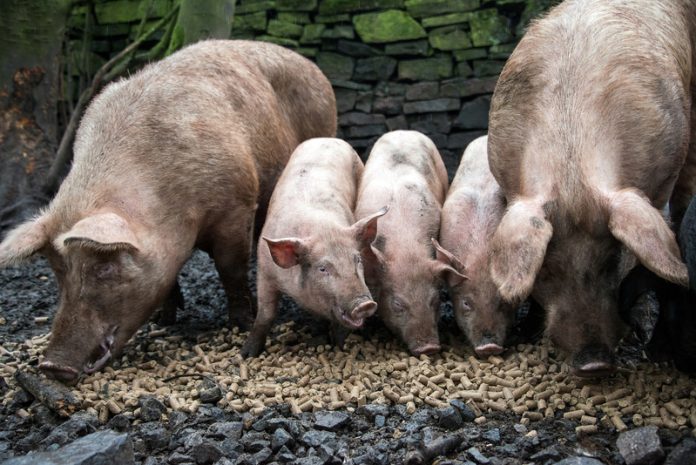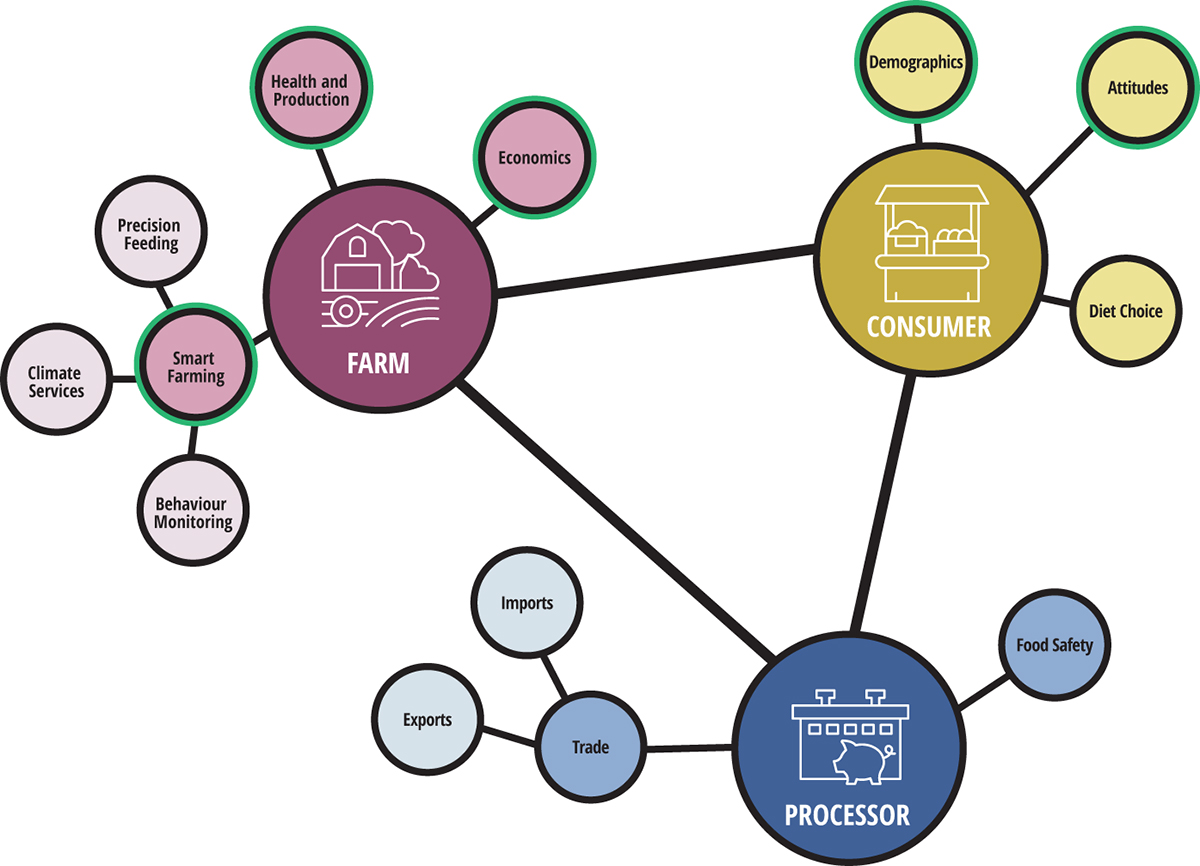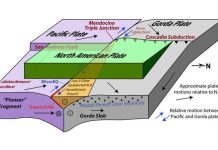Research at the University of Leeds provides innovative, systems-based solutions to help the UK pig farming industry navigate future challenges to resilience
Projections of a rise in the global human population to 9.6 billion by 2050 have triggered calls to rethink our use of resource-heavy practices that contribute towards global warming, are detrimental to the wider environment, and which lead to a system that perpetuates nutritional inequality across the world. It is increasingly clear that transforming the future of food and farming requires an in-depth understanding of how changes in policy, environmental conditions and consumer demand impact the system and the complex, intricate interactions that operate within it. We need to better understand how resilient the food system is to change.
One such proposed change is a move towards sustainable intensification of agriculture to meet the higher demand for healthy and nutritious food. In recent decades, the consumption of animal products – and pig meat in particular – has seen a global increase. Despite the overall increases in global demand, there are several potential risks for the pig industry; these include changes in climate, environmental emissions and soil health consequences, emerging and endemic infectious diseases and antimicrobial resistance, changes in global trade, and variability in consumer demand across different communities.
The Smart Agri-Systems research initiative, led by Professor Lisa Collins at the University of Leeds, uses industry-focussed, systems-based approaches to provide innovative solutions for a smarter food and farming future. As part of this initiative, Professor Collins is leading a programme of research to examine the resilience of the UK pig industry. From developing and using cutting-edge technology and data analytics for understanding variability at the level of the individual pig, through to investigating consumer decisions, the work being conducted allows a scalable view of the industry which can be used for testing a wide range of future scenarios.
Health and production
The industry is only as healthy as the pigs that are in it. With that in mind, research begins at the level of the individual pig, with current work investigating how and why some animals are more likely to develop health, welfare and disease issues than others. One such project is looking at how the environment in the uterus impacts on the development of aggressive behaviour and fertility issues later in life. Another project is investigating how nutrition can alleviate stress and influence animal health, welfare and productivity.
As part of the £2.1 million Global Food Security programme funded project PigSustain, Professor Collins and her team have joined forces with academics from the Universities of Reading, Lincoln, and the London School of Hygiene and Tropical Medicine, as well as the Animal and Plant Health Agency and a range of end-users to investigate the impacts of intensification and future changes on the resilience of the UK pig industry. This project bears witness to a major data collection, integration and analytics exercise comprising millions of records. This includes infrastructure, environmental, economics, production and health records collected on-farm, weather data from local stations, abattoir inspection reports, and submitted carcass diagnostics. Understanding historical trends and relationships will provide more reliable forecasts and predictions for future scenarios. It also allows us to see how the system has historically responded to shocks such as a widespread outbreak of infectious disease.
Smart farming
The University of Leeds’ Smart Farm is being developed with advanced monitoring and sensing technology, data capture, Internet of Things (IoT) and data analytics for use by a wide range of commercially relevant and cutting-edge agricultural, ecological, Earth and environmental research. The site is also home to the Centre for Innovation Excellence in Livestock (CIEL) pig research facility, with state-of-the-art systems for precision nutrition and optimised management.
The PigSustain project is developing an affordable, robust, on-farm surveillance technology to individually detect and track indoor-housed pigs without the need to physically mark or tag them for identification. The underpinning algorithms are being trained using machine learning to recognise and provide an early alert to farmers for cases of infectious disease and outbreaks of unwanted behaviours.
For outdoor pig production, a NERC-funded collaboration is investigating the use of satellites to remotely sense animal movement in relation to production performance, environmental emissions and soil erosion. This will be used to develop climate-smart solutions for resilient livestock production.
Economics
The economic viability of the pig industry is key to its long-term sustainability and the global competitiveness of the UK pig industry will come under increasing pressure in the coming years. The PigSustain team are investigating the realities of changing on-farm costs, by developing predictive models of how these components interact within the context of global pig production and future trade risks. This includes understanding the range of dynamic factors that impact decision-making processes around entering and exiting the industry.
Demographics and attitudes
Demographic variability and changing consumer attitudes affect meat consumption trends. PigSustain is using data collected as part of the Office for National Statistics’ Living Costs and Food Survey in combination with Census data to predict individual-level pork expenditure patterns in light of changing attitudes towards meat consumption.
A whole system approach
Using a systems modelling approach allows the exploration of industry resilience to future shocks and trends. Simulation models are being developed in PigSustain to characterise the whole supply chain, integrating outputs from across the programme of research. A key output of this will be a tool for end-users to assess risks and resilience in the face of future challenges, including proposals for alterations to policy.
Please note: This is a commercial profile
Professor Lisa Collins
Professor of Animal Science and
Director of Smart Agri-Systems
University of Leeds
Tel: +44 (0)11 33 43 59 40












